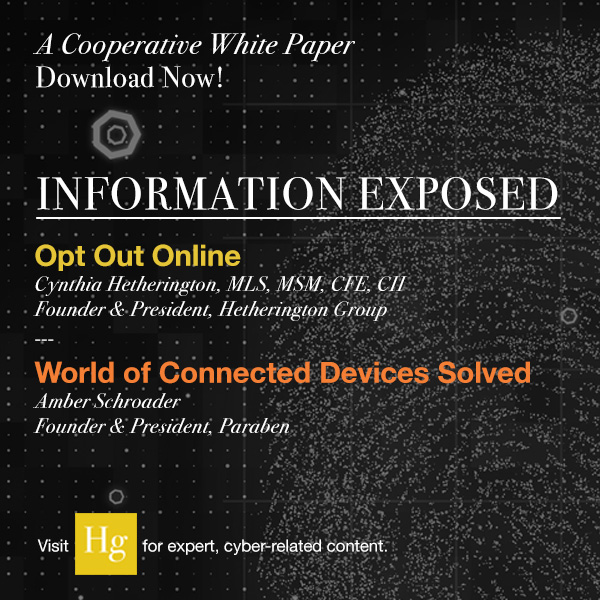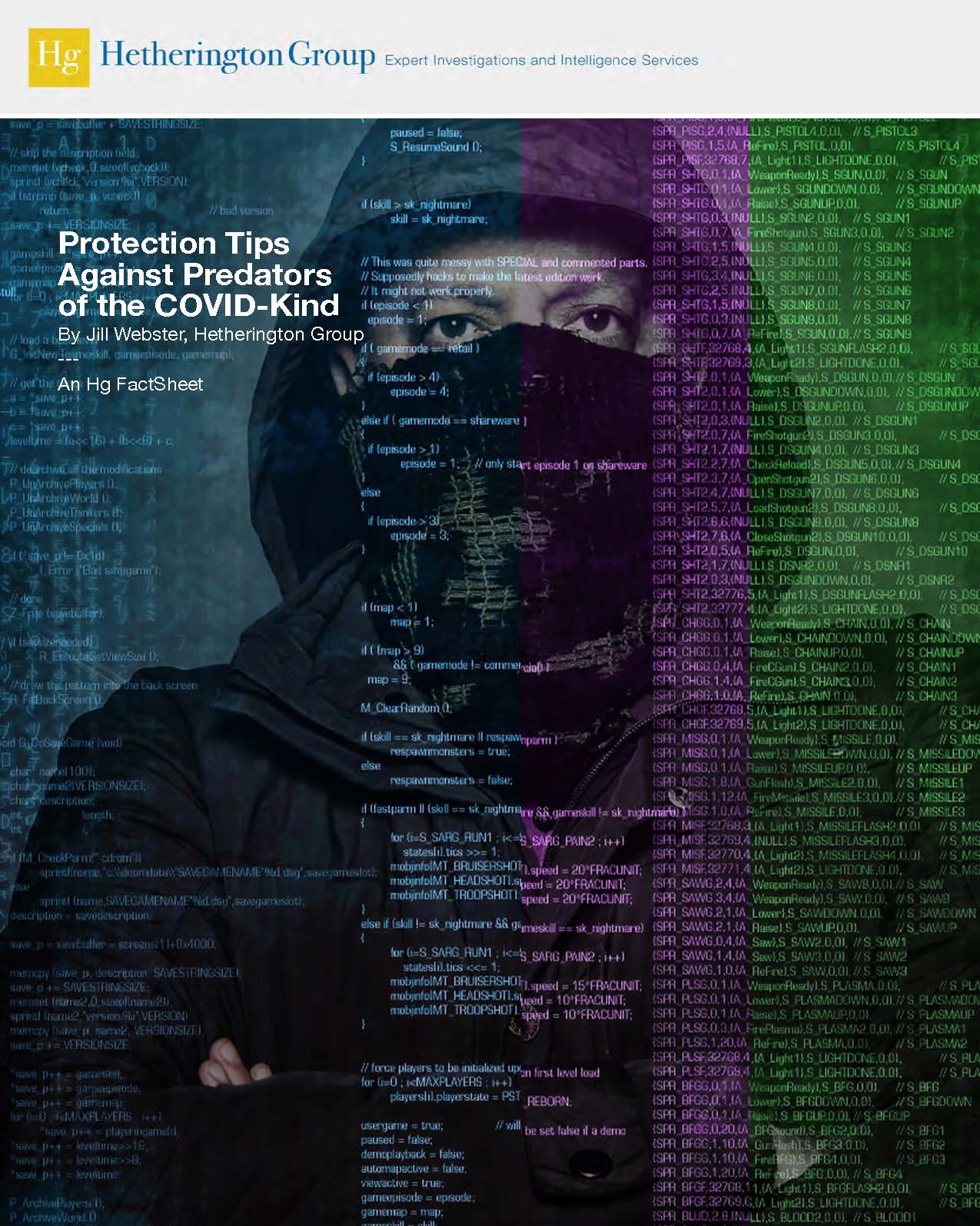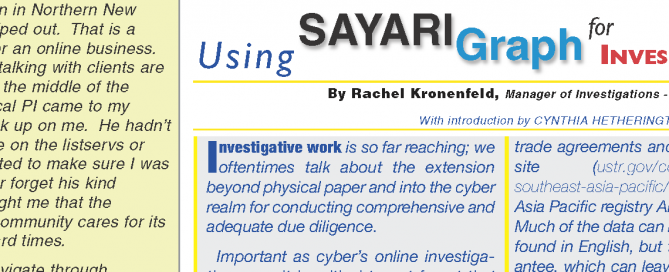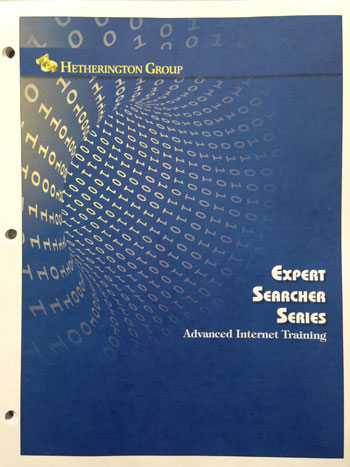This week, in support of ACFE’s Fraud Week 2020, we highlight some of our more popular anti-fraud blog posts, Data2Know newsletter articles, FactSheets, and webinars.
 Identity Theft
Identity Theft
Hetherington Group and Paraben Corporation published, Information Exposed, an informative user-friendly guide to help members of the general public understand the pros and cons of sharing personally identifiable information online and how to protect one’s self and loved ones from predators and fraudsters.
Part A of the report, Hg’s Opt Out Online, helps readers understand the dark side of information sharing, the pitfalls of oversharing, and how to reduce online risks. Appendix A offers useful tips for protecting personally identifiable information and preventing identity theft. Appendix B instructs on how to opt out of online vendors. Appendix C provides steps for removing personally identifiable information from three major DNA collection retrieval services. Part B of this report, Paraben’s The Internet of Things, explores connected devices and provides examples of best practices in order to exist as securely as possible in this connected world.
Coronavirus Fraud
In the summer, we issued an Hg FactSheet entitled, “Protection Tips against Predators of the COVID-KIND,” which highlights fraudulent schemes and provides tips for protecting businesses, seniors, and children. Here, we highlight some of the findings:
The world has been living under the threat of coronavirus for most of 2020. Hope is on the horizon, as two research firms—Pfizer and Moderna— have announced vaccines with 90-94.5% success rates. We may finally be pulling our planet out of the pandemic, but fraudsters will continue to try and capitalize on others’ suffering and vulnerability.
The Stats
> >The National Center for Missing & Exploited Children reported receiving 106% increase in CyberTipline reports in March 2020 compared to March 2019 and a 318% increase in April compared to April 2019.
>> In early March, INTERPOL conducted Operation Pangea, which covered 90 countries. 4.4 million units of illicit pharmaceuticals and 37,000 unauthorized and counterfeit medical devices (e.g., surgical masks, HIV self-testing kits and glucose monitoring) were seized globally.
>> In June, the long-known grandparent scheme reared its ugly head in New York and New Jersey: An estimated 100 seniors paid over $1 million to fraudsters claiming to be a loved one in need of emergency funds to pay for a hospital bill or bail.
>> In early July, the number of U.S. unemployment claims reached over 40 million workers, creating a perfect fraud storm for a government system not equipped to handle the numbers and a workforce on emotional edge and the brink of financial collapse.
>> This month, the Better Business Bureau provided holiday tips for protecting oneself from COVID-related scams that prey on shoppers seeking to attend pop-up holiday markets, with fake websites and Facebook pages collecting personally identifiable information, credit card information, and installing malware on your device.
Blog Posts
 Since we launched our blog in 2018, we have been writing on how we, as cyber investigators, integrate OSINT techniques into our fraud work. In 2018, we ran a series on how social media bots can steal identities and trademarked images. We also reviewed the JOBS Act and provided tips for investors interested in hedge fund crowdfunding opportunities. We issued a 5-part series on the most common types of financial fraud—Ponzi Schemes & Manipulation, Backdating Stocks, Insider Trading, Short Selling, and Pump and Dump Schemes—and how due diligence investigators can protect your company’s assets and investments by tracking down fraudsters. Our final post, “Rajat Gupta & the Beneficial Penny of Insider Trading,” explored the ins and outs of one of the largest fraud cases in SEC history. This year, we have focused on fraud related to Covid, issuing posts on how to protect seniors, businesses and employees, and children.
Since we launched our blog in 2018, we have been writing on how we, as cyber investigators, integrate OSINT techniques into our fraud work. In 2018, we ran a series on how social media bots can steal identities and trademarked images. We also reviewed the JOBS Act and provided tips for investors interested in hedge fund crowdfunding opportunities. We issued a 5-part series on the most common types of financial fraud—Ponzi Schemes & Manipulation, Backdating Stocks, Insider Trading, Short Selling, and Pump and Dump Schemes—and how due diligence investigators can protect your company’s assets and investments by tracking down fraudsters. Our final post, “Rajat Gupta & the Beneficial Penny of Insider Trading,” explored the ins and outs of one of the largest fraud cases in SEC history. This year, we have focused on fraud related to Covid, issuing posts on how to protect seniors, businesses and employees, and children.
Webinars
![]() Throughout the year, Hetherington Group offers monthly live webinars on current investigative tactics involving social networks, search engines, due diligence and fraud, the Dark Web, and other related topics. This year we offered three webinars to help fraud investigators in the OSINT research:
Throughout the year, Hetherington Group offers monthly live webinars on current investigative tactics involving social networks, search engines, due diligence and fraud, the Dark Web, and other related topics. This year we offered three webinars to help fraud investigators in the OSINT research:
- Media, Open Sources and Private Tools for Due Diligence, which explores the mandatory databases for conducting business background investigations and due diligence
- Online Image Tracking & IP Tracing, which explores how to track down images online, whether copyrighted or sensitive.
- Advanced Online Due Diligence, which explores the databases, Web sites, and Internet resources required to locate difficult information on companies, their assets, and the people that run them.
All webinars are recorded and available for purchase.
Data2Know Newsletters
 In our newsletter article, Searching For Videos & Images On The Internet, guest contributing author and OSINT officer Janiece Mondale provided readers best practices for online intelligence professionals to conquer the overwhelming amount of content on the internet. In “Due Diligence for Compliance” by Cynthia Hetherington, we explore the impact that the CFIUS and FIRRMA have had on an investigator’s practices and available tools. Hg’s Rachel Kronenfeld’s article, “Using Sayari Graph for Investigations,” examines the use of Sayari for intelligence analysts and corporate risk management professionals in the collection, extraction, and analysis of data across borders and languages. Sayari can be used for due diligence to reduce risk or to enter a new market, to meet compliance or regulatory requirements, or to prevent fraud, financial crimes, and corruption.
In our newsletter article, Searching For Videos & Images On The Internet, guest contributing author and OSINT officer Janiece Mondale provided readers best practices for online intelligence professionals to conquer the overwhelming amount of content on the internet. In “Due Diligence for Compliance” by Cynthia Hetherington, we explore the impact that the CFIUS and FIRRMA have had on an investigator’s practices and available tools. Hg’s Rachel Kronenfeld’s article, “Using Sayari Graph for Investigations,” examines the use of Sayari for intelligence analysts and corporate risk management professionals in the collection, extraction, and analysis of data across borders and languages. Sayari can be used for due diligence to reduce risk or to enter a new market, to meet compliance or regulatory requirements, or to prevent fraud, financial crimes, and corruption.




